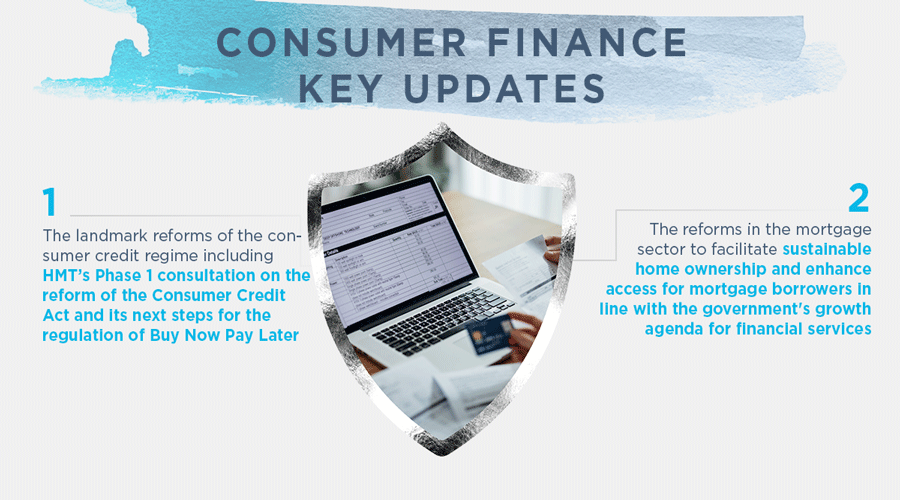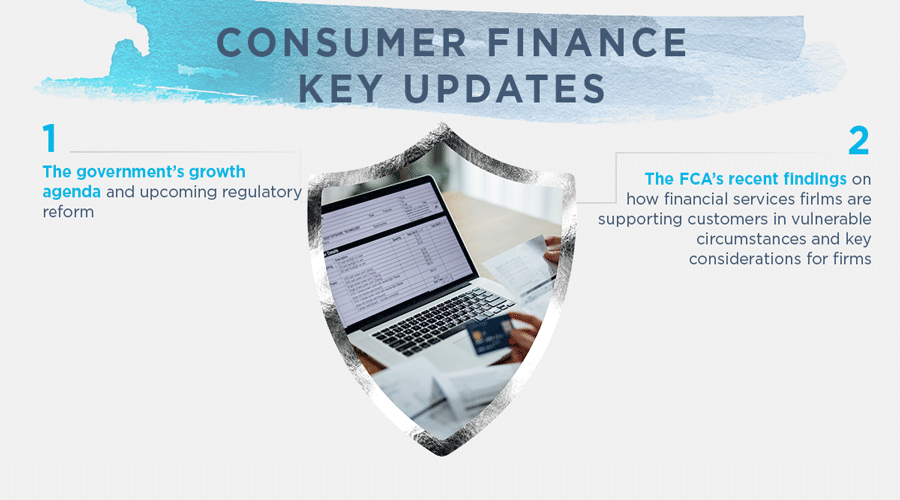Reform of the CCA has been on the regulatory reform agenda since 2014. Recognised as an outdated, complex and restrictive framework of legislation, it is no longer appropriate for the way in which consumer finance is regulated in the UK nor the way customers and firms engage with financial services. The government aims to modernise the CCA to create a simpler, more flexible regulatory framework that aligns with the FCA's principles-based approach to regulation. The reform is intended to ensure robust consumer protection while enabling firms to innovate and deliver good outcomes under the FCA's Consumer Duty.
So how the reform will be delivered?
The government intends to repeal many of the remaining CCA provisions and much of the associated secondary legislation. The FCA will then recast conduct requirements in its Handbook. Some provisions which are not capable of being recreated in FCA rules are expected to be retained in legislation to ensure robust consumer protection.
The reform will be delivered in two phases due to the scale and complexity of the work:
Phase 1 (this consultation): focusing on information requirements, sanctions, and criminal offences.
Phase 2 (future consultation): will cover rights and protections, scope of regulation, and key definitions.
Phase 1- key proposals for the reform
The government proposes to repeal all information provisions in the CCA and accompanying regulations and recast them into FCA rules where necessary. HMT is also proposing to repeal provisions relating to Small Agreements, Modifying Agreements and Multiple Agreements and the relevant disclosure requirements.
The FCA will consult on these changes, ensuring the rules are outcomes-based, proportionate, and aligned with the Consumer Duty.
The government also proposes removing automatic sanctions. HMT’s view is that automatic sanctions, such as unenforceability and disentitlement to interest, are disproportionate and create legal uncertainty. It is therefore proposing to repeal all these provisions and rely on the FCA's supervisory and enforcement toolkit. The government is also considering repealing all criminal offences and replacing them with FCA rules where appropriate.
Possible considerations for firms
- Firms have an opportunity to innovate in product design and customer engagement under a more flexible regime while aligning with the FCA's Consumer Duty.
- Investments in technology and tailored communications can enhance digital engagement, improve consumer understanding, and ensure compliance with FCA's expectations under Consumer Duty.
- While automatic sanctions may be repealed, firms must remain vigilant about FCA enforcement actions, reputational risks, and the need for proactive remediation and redress where harm is caused.
- Businesses should evaluate the impact of the proposed repeal of the above CCA provisions, prepare for the transition to FCA rules, and review internal processes and compliance frameworks.
Look ahead to Phase 2 and Next Steps
Stakeholders are invited to provide input on the proposals and are requested to send any responses to consumercreditact@hmtreasury.gov.uk by 21 July 2025.
The timeline for the government's response to the Phase 1 consultation is not explicitly stated but will occur before Phase 2 is published, which is planned during Q1 2026.
Phase 2 of the reform will include a further consultation which will set out how the government intends to reform the scope of regulation and rights and protections under the CCA. HMT have also identified four cross-cutting areas which it will consider across Phase 1 and 2 consultations. These cover Islamic finance, green finance, technological advancements and the Public Sector Equality Duty (PSED) & Environmental Principles Policy Statement (EPPS) Duty.
For further information and resources please visit our CCA reform webpage here.
On 19 May 2025 government entered the next phase of the regulation of BNPL by publishing a response to its consultation in October 2024. The response summarises the feedback it received and sets out the government's final position on the proposed regulatory regime.
The government has also published and laid the draft affirmative statutory instrument (The Financial Services and Markets Act 2000 (Regulated Activities etc.) (Amendment) Order 2025) for bringing BNPL products into regulation.
Overview of the key legislative changes
Third party-lenders offering BNPL agreements will be regulated
The government is proceeding with its proposals to amend the exemption in article 60F of the Regulated Activities Order (RAO), to bring third party-lenders offering 'deferred payment credit' (DPC) agreements, which include BNPL agreements, into regulation. They will become a new category of regulated credit agreements within the meaning of article 60B(3) of the RAO.
It is also maintaining its proposed approach that certain low-risk agreements will remain outside of the regulation such as those facilitated by employers and Registered Social Landlords. Merchant provided credit market will also remain out of scope for now as the government may consider bringing it within scope if potential consumer harm is detected in this market in future.
The regulatory framework also includes specific anti-avoidance measures to prevent third party lenders becoming the merchant by transfer of title of the goods.
Disclosure requirements
The information and disclosure requirements in the CCA will be disapplied and replaced with a new FCA disclosure regime probably based on Consumer Duty. This aligns with the government's broader CCA reform plans to repeal the CCA information disclosure requirements and recast them into FCA rules. Though it is not clear what the information requirements will look like for BNPL products, we could possibly see some degree of prescription in future FCA rules. However, aligning with the broader theme for CCA reform, it is likely that firms will be encouraged to innovate the presentation of their agreements, focusing on simplicity and accessibility.
Credit Broking and Financial Promotions
Merchants offering BNPL agreements as a payment option will not require credit broking permissions. The proposed new article 36FB of the RAO will achieve this policy position.
However financial promotions communicated by unauthorised merchants who offer third party lender BNPL agreements will need to be approved by a Financial Services and Markets Act 2000 (FSMA) authorised person under section 21(2)(b). In other words, financial promotions for regulated BNPL agreements will be brought within scope of the FCA financial promotions regime. Accordingly, the Financial Services and Markets Act 2000 (Financial Promotion) Order 2005 is being amended so financial promotions for these newly regulated DPCs will not fall within the article 15 exemption. FCA has previously indicated that BNPL providers may prefer to issue their own financial promotions for use by partner merchants.
Although initially HMT proposed that domestic premises suppliers will not fall within this credit broking exemption, in a follow up update published on 16 June 2025, HMT announced that following industry and FCA engagement, the government has decided to exempt domestic premises suppliers from requiring credit broking permissions to offer BNPL products as a payment option.
Small Agreements and BNPL
The earlier proposal to introduce a new section 17(1)(a) in the CCA, specifying that newly regulated agreements up to £50 would not be classified as 'small agreements', which was intended to ensure consistent treatment of BNPL agreements above and below £50, is no longer mentioned in the government’s response. This aligns with the government's proposed plans to repeal the Small Agreements provision in the CCA across all regulated agreements.
Next Steps and the Temporary Permissions Regime
The draft SI sets the ‘Regulation Day’ as 12 months from the SI being made, at which point BNPL products will become regulated. The government has not indicated a timeline for when the SI will be made.
The FCA is expected to consult on its proposed rules shortly after the SI is made and will have 12 months to finalise the BNPL regime. BNPL products will then enter regulation around mid-2026.
Once the SI is made, unauthorised firms who are carrying out BNPL activities would be able to apply to the FCA for a temporary permission. Those wishing to obtain temporary permission must register with the FCA at that time. The Temporary Permissions Regime (TPR) will allow firms to carry out the activities in relation to regulated DPCs for a limited time as if it had a FSMA Part 4A permission. Following ‘Regulation Day’, TPR firms will be able to apply for full FCA authorisation.









